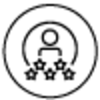International Day of Persons with Disabilities 2023

Written by Christina Sanakidis, Manager of Diversity, Equity, Inclusion and Belonging
In 1992, the United Nations (UN) declared December 3 the International Day of Persons with Disabilities (IDPWD).
IDPWD isn’t just a UN day; it’s a day for everyone — all people, organizations, and schools — because we all have a vital role to play in identifying and addressing discrimination, marginalization, exclusion, and inaccessibility that many people living with disabilities face. This day on the international calendar symbolizes the actions we should take every day to create diverse and accepting communities.
What is IDPWD for?
- Celebration: Recognize and value the diverse abilities of our global community and cherish the role we all play.
- Learning: Understand and learn from the experiences of people with disabilities.
- Optimism: Look towards the future and the creation of a world where a person is not characterized only by their disabilities but by the full range of who they are and what they are capable of.
- Action: All people, organizations, agencies, and charities show their support for IDPWD and commit to creating a world characterized by equal human rights.
Understanding disability
Someone can be born with a disability or become disabled at any time in their life. Disability is a spectrum, with some folks needing more support than others to meet social and individual needs.
Disbelieving or ignoring non-visible and visible disabilities is a barrier to inclusion. It increases difficulties for disabled people to find supportive environments where they can be productive, accept leadership opportunities, and maintain their dignity and independence. The YMCA can address this using a universal design model, moving away from thinking that accommodations can adequately address all barriers to participation.
It’s also important to be aware of how individuals with disabilities face discrimination, compounded by other parts of their identities such as race, gender, sexuality, and age. Listening to disabled people is the first step to dismantling the inequities that are systemic in our culture and society, which discriminate intentionally or unintentionally. This intersectional approach is rooted in the disability justice model, which examines disability and ableism as they relate to other forms of oppression and identity.
Not all disabilities are visible
We often think about visible physical disabilities, like using a cane or a wheelchair, but many disabilities are non-visible. An individual’s mind, body, or senses can vary in ability in ways that differ from those without disability.
Loosely defined, an invisible disability is a disability that is not immediately noticeable. They can also include brain injuries, chronic illnesses, pain conditions, mental illness, gastrointestinal disorders, and more. Because they’re not apparent to spot, invisible disabilities may be overlooked and misunderstood.
Folks may also be neurodivergent. These are people who experience the world in unique ways, as their brains function differently from their neurotypical counterparts. , meaning individual differences in brain functioning that commonly occur within humans can include autism, dyslexia, attention deficit hyperactivity disorder (ADHD), and others. Not all these disabilities may be apparent to others during regular, personal interactions. It’s important to consider all types of disabilities when working to advance diversity, equity, inclusion, and belonging in our communities.
How can I learn more?
Visit the YMCA of Greater Toronto’s Diversity, Equity, Inclusion, and Belonging strategy. And engage with the following resources :
The Micropedia of Microaggressions, Disability. Learn about microaggressions. What are they? How can I avoid them? How should I respond? How can I be accountable?
Person First or Identity First Language. Find out what you should say when talking about people and disabilities.
10 Ways to Avoid Everyday Ableism. A must-have guide about ableism.
Invisible Disability Project’s Glossary of Terms. Words Matter. Using language to challenge old beliefs gives deeper meaning to our lives and experiences —it also gives us power. We must become comfortable altering, revising, and shifting terms and definitions relating to disability to reflect new feelings, attitudes, and beliefs.
Evolving the Understanding of Disability and Accessibility. Additional disability and accessibility resources are available in this 2022 YMCA blog post.











